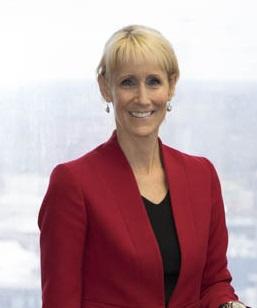
Caption
Georgia Department of Behavioral Health and Developmental Disabilities Commissioner Judy Fitzgerald
Credit: Georgia Health News
The combination of experiences of isolation and depression during the pandemic shutdown, the revelation of suicidal thoughts by public figures such as Meghan Markle, and state leaders prioritizing mental health in the budget, is helping to remove stigma from discussions about mental health.

Georgia Department of Behavioral Health and Developmental Disabilities Commissioner Judy Fitzgerald
“We really think that this is a watershed moment for behavioral health," said Judy Fitzgerald, commissioner of the Georgia Department of Behavioral Health and Developmental Disabilities (DBHDD). "People are talking about mental illness in a way that they haven't before."
Like the rest of the state, DBHDD had struggles with managing the pandemic. In the end, the agency's five hospitals had a total of 1,326 positive COVID-19 cases among patients and staff. There were nine deaths.
"There were early days of chaos and concern and people trying to very quickly absorb large amounts of information so that they could adapt," Fitzgerald said. "The early positive cases caused some panic and, where we lost lives, it was tragic. But we were immensely grateful for the support we got."
Fitzgerald praised the agency's medical directors for pivoting early on to create safe environments in their hospital and community settings. She is also grateful to help from the governor's office, including the National Guard troops he sent to give them some aid.
As Fitzgerald reflects on the past year, she realizes the shutdown offered a greater understanding of mental health issues.
"I do think this is one silver lining of the pandemic," Fitzgerald said. "It has allowed people to say these feelings are real and want to talk to someone about it.
We (DBHDD) want to be there to say, and when you want to do that, we want to connect you to services and supports that can walk alongside you as you navigate those challenges," she said.
DBHDD is getting a much-needed recognition and financial boost from the Georgia General Assembly. The Georgia House version of the Fiscal Year 2022 budget that begins on July 1 of this year gives $1.2 billion in state dollars.
Earlier this month, David Ralston, Speaker of the Georgia House of Representatives, publicly acknowledged the need for more funding for DBHDD.
"It's never as much as you hope to do, but I think this was a realistic effort, and I think it sends a strong message that we're making mental health a priority in Georgia," Ralston told reporters.
Fitzgerald acknowledges the support of state leaders and others in the public eye help take the fear and stigma out of mental health.
Among those to recently admit struggles with thoughts of suicide was Markle, duchess of Sussex.
"These public figures are so important," Fitzgerald said." They're really helping to destigmatize. (They) help people be more comfortable saying if these people I look up to or respect or (someone who) I think they have everything in the world and can talk about their challenges, maybe it's okay for me not just to talk about them, but to say, 'I think I need some help here.'"